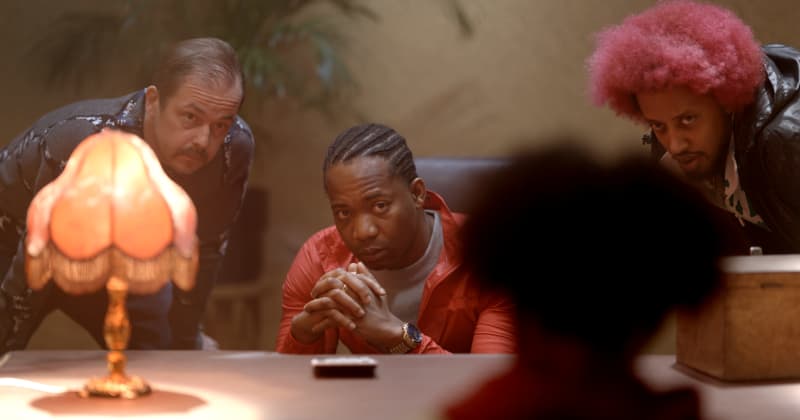Somalis are often portrayed in films through racism and generalisations about skin colour. The makers of Goodwill wanted to treat the protagonists as individuals. Offensive language is not used in the film.
Relationships are important, and above all, childhood friends are definitely worth holding on to.
A young Somali man tries to stay on the straight and narrow, but the ghosts of his past are soon on his heels.
*Hyväveli* is one of the few Finnish films starring non-white actors. Bile and Abdulla, who come from Somali backgrounds, have never been offered such big roles before.
– It was nice to hear that I am worthy of a leading role in a movie, Bile says before the premiere.
Roles are written for Jussi and Liisa
The idea for the *Hyväveli* film was born years ago. Sami Laitinen followed the discussion about why all the main roles in Finnish films went to white actors. Of course, it was primarily due to the fact that the roles were written for \”Penti, Jussi and Liisa\”.
Laitinen figured out that he could try to write something else.
– I thought that I was so privileged that it might be possible for me to make a film.
Around the same time, Laitinen was talking with his Somali friend and suggested that he become a police officer. The guy immediately gave a bunch of reasons why the idea is completely absurd.
– One concrete thing was why would I defend the values \u200b\u200bof this society and this world when it is not on my side, Laitinen says.

He came up with the idea that the upcoming film should be about a policeman with a Somali background.
At the beginning of the 2000s, Laitinen worked as a youth director in Herttoniemi, Eastern Helsinki, and ran a film workshop aimed at young people. He worked as an editor and assistant director, for example in the music documentary *Soundbreaker* (2012), which was nominated for Jussi.
In 2014, Laitinen completed his feature directorial debut *Muutoksii* (2014), which told the story of the clash between skins and Somalis and the friendship between two boys.
*Muutoksii* was also Abdullan Kamalud Ahmed Abdulla’s debut film.
– I’m such a *yes man*. If I haven’t done something before, I go and try it, says Abdulla.
*Good Brother* is Abdulla’s fourth film. The role is by far the biggest.

So does Abdirahman Bile, who plays Loyan. He was first offered a smaller supporting role. The party didn’t bother him, he says he was ready to even take on the roles of a passer-by (they’ve been done too). During the auditions, Laitinen revealed that the main role was still being sought.
– I’m good at pretending that I can’t beat a bunny. I shot the test in peace with Kaye (Kamaludin Ahmed Abdulla) and Riku (Kemppinen). Three weeks before the cameras started rolling, Sam got a call saying he wanted me in the lead role. I had just been to the store. Pepsi Max fell to the ground out of luck, Bile recalls.
No n-word
Sami Laitinen says that everyone is guilty of stereotypes and generalizations. Even he himself. The script of the movie *Hyväveli* was discussed with the actors until filming.
Together, it was decided that in this film there is no need to show how the main character eats food with his hands or greets every black person he meets on the street. Culture and, for example, music do not need to be particularly introduced.
That kind of thing easily slips into exoticization, astonishment, which in itself should maintain the difference between a foreigner and a native Finn.
It was also clear that no racist terms would be used about the black characters. It has already been done too much in domestic cinema, says Bile.
– It’s really lazy writing when it is presented that the guy is a racist by using the n-word. You can’t bring anything new to a movie by using the n-word. It’s such a raw, powerful word.

Domestic cinema is diversifying
In 2017, Longplay revealed the secret Facebook group of the Finnish police has been discussed a lot in recent years.
This fall, the Supreme Administrative Court sentenced the Helsinki police to a fine for ethnic profiling. The police stopped the female relatives of the rapper Musta Barbaari on the street in 2016.
News reporting was in mind when writing the script for Hyväveli. Director Laitinen hopes that the film will inspire black and brown people to apply to become police officers. That would be one way to eradicate racism.
– It’s the truth that there are no guys who look like me at the top of the police hierarchy. It’s unfortunate, but that’s just not Finnish culture. But these are made to be broken, says Abdirahman Bile.

In domestic cinema, the number of minorities seems to be increasing, and it is partly a result of the fact that there are people from various backgrounds in the production teams.
More casting events are organized for POC actors (POC \u003d person of color, non-white). It is justified. Somali is spoken by more than 20,000 people in Finland as their mother tongue, but Somalis have hardly been seen in films.
– Now all the pens are in hand to write better and more attractive stories, where there are also people other than native Finns.

